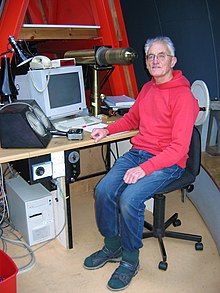Roger Griffin (astronomer)
Roger F. Griffin | |
|---|---|
 | |
| Born | 23 August 1935[1] |
| Died | 12 February 2021 (aged 85)[1] |
| Alma mater | University of Cambridge |
| Scientific career | |
| Fields | Astronomy |
| Institutions | University of Cambridge, California Institute of Technology |
Roger Francis Griffin (23 August 1935 – 12 February 2021) was an astronomer and emeritus professor of Observational Astronomy at the University of Cambridge.[2][3]
Griffin was raised in Surrey, and educated at Caterham School and St John's College, Cambridge, where he studied for a BA in Natural Sciences and a PhD in Astronomy. After receiving his doctorate he was a Research Fellow at St John's, and a Fellow there from 1972 until his death.[1] His most notable works are in the area of spectrography of stars.[4]
Griffin featured, along with Donald Lynden-Bell, Neville Woolf, and Wallace Sargent, in the 2015 documentary Star Men, which detailed their camaraderie and contributions to astronomy, and retraced their trip through the Southwestern United States.
Major publications
[edit]- Griffin RF. Positions of optical objects in the fields of 42 radio sources. The Astronomical Journal. 1963 Aug;68:421. According to Google Scholar, this article has been cited 107 times.[5]
- Krisciunas K, Griffin RF, Guinan EF, Luedeke KD, McCook GP. 9 Aurigae: strong evidence for non-radial pulsations. Monthly Notices of the Royal Astronomical Society. 1995 Apr 1;273(3):662-74. According to Google Scholar, this article has been cited 49 times.[5]
- Griffin, RF. A Photometric Atlas of the Spectrum of Arcturus, λλ 3600-8825 Å. Cambridge Philosophical Society. 1968. 302 citations.
References
[edit]- ^ a b c "Stargazer and Fellow of St John's dies aged 85 | StJohns". www.joh.cam.ac.uk. 17 February 2021. Retrieved 17 February 2021.
- ^ "Professor Roger F Griffin". www.joh.cam.ac.uk. Retrieved 17 February 2021.
- ^ "International Astronomical Union | IAU". www.iau.org.
- ^ "NASA/ADS". ui.adsabs.harvard.edu.
- ^ a b "Google Scholar". scholar.google.com. Retrieved 20 June 2020.
